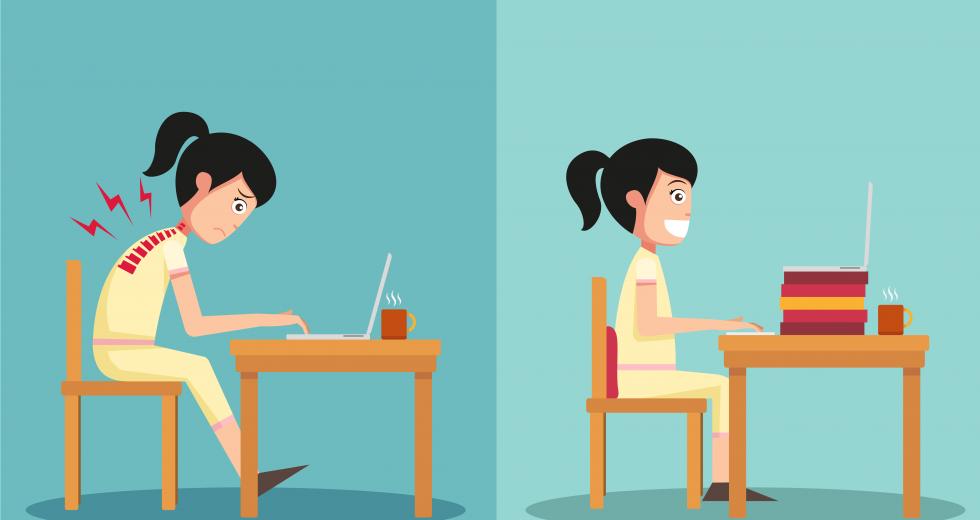Today, our bodies still have this expectation baked in, says Max Vercruyssen, a retired ergonomist and human-performance specialist who’s conducted pioneering research related to posture. That means, depending on how you hold yourself, there could be huge differences in how your body operates, which could have major implications for office workers looking to boost their productivity.
Posture matters more than you may think. In fact, there’s evidence that whether you sit up straight or slouch affects the quality of your work. To understand why, it can be helpful to look back at our evolutionary ancestors. Millions of years ago, if you were sitting or lying down, the chances were pretty good you were in a relatively safe spot and could let your guard down. If you were standing or moving around, though, being extra attentive might mean the difference between finding food and becoming prey.
Today, our bodies still have this expectation baked in, says Max Vercruyssen, a retired ergonomist and human-performance specialist who’s conducted pioneering research related to posture. That means, depending on how you hold yourself, there could be huge differences in how your body operates, which could have major implications for office workers looking to boost their productivity.
Sit Up Straight to Fight the Post-Lunch Slump
One key change that occurs when you sit up straight or stand: Your heart rate goes up about 10 beats per minute, providing a possible increase in reaction time and attention, according to Vercruyssen.
He suggests adjusting your posture or standing up straight when you have a task that requires extra attention and focus. Just don’t expect it to be a cure-all: Any posture-related changes to your performance are likely to be most noticeable when you’re exhausted or coming out of a post-lunch slump. “To think it’s going to have a major effect when you’re already optimally motivated may be a disappointment,” Vercruyssen says.
Got a Tough Task? Try Being Uncomfortable
Ergonomics is all about trade-offs. According to Vercruyssen, the more comfortable we are, the easier it is to crash, lose focus, and possibly even doze off. “Sitting on a hard chair is going to have you more activated than a comfortable chair,” he says.
Vercruyssen suggests balancing this trade-off by sorting and scheduling your tasks by difficulty. If you feel like you can stomach the discomfort of standing or sitting up straight for only short bursts, use this time take on your most taxing projects. If there’s something you could do in your sleep, that’s a good time to get comfy.
Still not sold on giving up your lounge chair? According to Vercruyssen, getting up for even a few minutes—to use the restroom or grab a glass of water, for example—can help boost your brain and zap you out of that midafternoon slump.
And before you toss out your Aeron for a hard block of wood, be aware that there’s a difference between mild discomfort and subjecting yourself to a positively painful posture. “This discomfort is going to become a focus of your attention, so you’re not going to be able to devote the attention to the task that you want to do,” says Bill Yates, a professor of otolaryngology and neuroscience at the University of Pittsburgh.
Slouching Makes You Sad
It may not be surprising to learn that when we’re feeling depressed or defeated, our bodies tend to slump. What is surprising: This effect goes both ways, and simply slouching seems to bring out these negative thoughts and generally make us feel worse for wear.
In a series of studies, Erik Peper, a professor of health education at San Francisco State University, had participants sit in various positions and then asked them to recall either negative thoughts and memories or positive and empowering ones. Slouchers had a harder time recalling the positive thoughts. “If you take on a collapsed position, it really shifts the physiology,” Peper says. “Testosterone goes down, cortisol goes up, you’ll have more access to helpless and hopeless thoughts, and your brain has to do more work to bring up positive ones.”
Peper chalks this effect up to what he calls a “cowering position,” which is commonly adopted by animals who have been defeated or are showing deference in the face of danger. “This position in mammals says, ‘Dont hurt me,’ but we have taken it on for hours a day because of our furniture design,” he says. “As a result, our bodies evoke these qualities, and we don’t even recognize it. We just feel like we’ve lost our drive or initiative after sitting all day.”
The good news: Peper found the opposite effect to be true as well. Subjects who sat up had an easier time recalling positive and optimistic memories, and just 30 seconds of skipping in place was shown to markedly improve mood and energy levels.



